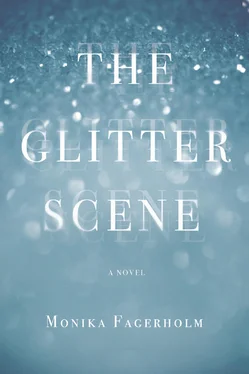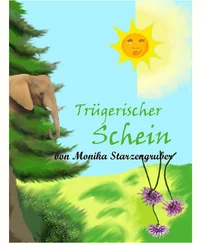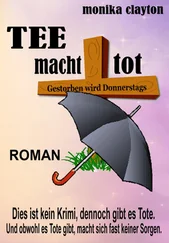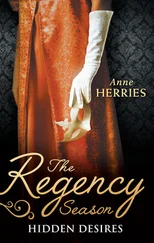And there comes the Big-Eyed One with her mother, they are almost always there. Wildflowers picked on the meadows arranged in neat bouquets, several of them. Newly washed glass jars filled with water, bouquets placed in them to later be set on the graves, often the ones that no one else really looks after.
“Buhuu! I’m the Angel of Death!”
The girl fills jars with water in the stone grove where the water pump is located, a good opportunity; her mother somewhere else. Maj-Gun rushes up with the mask on. The girl looks up, confused but not afraid, not the slightest. And Tom Maalamaa behind Maj-Gun suddenly, says, “hi.” To the girl, the girl answers, “hi.”
And back to the rectory again, in her brother’s room. Two siblings, dog and cat, throwing pillows at each other.
“Her big eyes,” says Tom Maalamaa, who is throwing a pillow on his sister with the dandelion in her mouth and the silver shoes on her feet again .
“Her big stupid eyes,” his sister clarifies. Hamba hamba . Throws the pillow back, right in her brother’s face. But you can definitely see that she, the Big-Eyed One, has made an impression on him.
And later, after childhood: not so much anymore. Grows up. The family leaves the rectory because the father is given a position in another place. Tom Maalamaa moves away after high school graduation and starts studying law at the university, finishes quickly, becomes a lawyer. Maj-Gun, herself, in some way, the Girl from Borneo, takes her bag and baggage and moves to a rented room in the leafy suburbs below the square in the town center. Remains in the District, does not get anywhere for a long time. Works in the newsstand at the square, for many years it turns out, and moves from one rented room in the attic of one house to another rented room in the attic of another house. The years pass, Maj-Gun in the newsstand, sitting where she is sitting, on a bar stool. “Today is the first day of the rest of your life,” it reads on a card on the back of the cash register. And then one afternoon in the late summer of 1989 Big-Eyed Susette Packlén, whom she has already gotten to know a little, separate from Tom and everyone else, comes walking across the square.
SUSETTE AND THE DARKNESS, 1989
Sometimes Susette Packlén imagines that she is a horrible flower that is about to bloom. But often, with Maj-Gun at the newsstand, she thinks about love .
MAJ-GUN, AT THE NEWSSTAND. Maj-Gun Maalamaa.
On a bar stool behind the counter, among the newspapers and lottery tickets, tips and games. Sweaty, perspiring, in time a luxuriant creature. At some point maybe shiny letters on a yellowed card on the back of the cash register, the first thing you see when you come inside: “Today is the first day of the rest of your life.”
Worn text on a grayish-blue landscape, rather abstract. Round, white moon in the upper right-hand corner and shadows of a spruce forest down to the left—an explicitness?
•
But first, they are still only children then, Maj-Gun is at the rectory, at the entrance to the cemetery, the old part. Nothing strange about that, of course: Maj-Gun is the Pastor’s daughter and her mother works as deaconess in the assembly. Or Majjunn , that is what she is called back then, or at least the name she uses for herself.
“Say Pastor’s Crown Princess,” Maj-Gun yells, “that’s the password.” Hangs on the metal gate, it goes tjii this way tjii that way, back and forth in the wind despite the weight of Majjunn’s large body. Not exactly a fat body but significantly larger than Susette Packlén’s, which is almost as old. They go to the same elementary school, she and Majjunn, but they do not hang out, are not friends.
“Say Pastor’s Crown Pr—”
You do not say it. You say nothing. You walk past. The gate is open even though Majjunn is hanging on it. But still, amusing, when you walk by, how that name Majjunn sticks in your head. Plays there, sometimes, in silence. Majjunn Majjunn you repeat silently to yourself; the name glues itself to your tongue, becomes stuck in your mouth.
You carry bluebells in your hands.
One bouquet and several, sometimes a whole armful that will be divided into smaller bouquets inside the cemetery; tidily organized in glass jars you bring from home. You: Susette and her mother, that is, who have a habit of going to the cemetery, just the two of them, together. Moreover, sometimes they have boiled the glass jars in water at home in the kitchen in their own house with a garden where they are living at that time in the lush suburbs below the square in the town center so that they have become really transparently clean. Not even just the two of them then, during her childhood, rather Susette and her mother and her father and two older brothers.
And they fill the jars with water from the buckets placed by the hydrant in a stone-covered arbor rather close to the entrance.
Flowers to place on the “Graves of the Forgotten.”
You have been out yourself, picking flowers in the meadows above the town center.
With Mom. It is hard to explain this without sounding crazy: but seriously, nothing strange in that work at all. Picking flowers, taking them to the graves in the cemetery that look decayed, abandoned.
“Say Pastor’s Cr—” Into the cemetery as said, and Majjunn’s voice petering out in the background. Later: at the gravestones, Susette knows some of the names by heart. Ephraim. Aline. Betel. Strange names, but still very pretty.
Scrapes the letters clean of earth and various bits of trash, weeds the ground in front of the stones.
And sets out bluebells and wood anemones in jars with water. Comes and replaces them: new flowers, fresh new water. They tend to laugh together, Susette and her mother: barely have time to wither and they are there again replacing them.
•
The Confession Grove. It is a bit off to the side. There is not exactly a sign with “The Confession Grove,” but Majjunn who, as said, is from the Pastor’s family, knows that sort of thing. Because she follows them sometimes, Susette and her mother, like a willing pathfinder even though no one has asked her.
“You’ll see it down there. To the left.”
And adds, rather pompously, “If you then wander in the valley of the shadow of death no harm will come to you.” And, then, holding a hand to her ear. “Listen. Here at the cemetery you can say things that would sound completely cuckoo anywhere else.”
Maj-Gun has a toy mask over her face. “Ho ho ho,” she laughs. It is cuckoo; Susette’s mother laughs, the mask reminds her of a movie star. “Ingrid Bergman? Ava Gardner?” Majjunn takes off the mask, wipes sweat from her brow, does not answer.
•
Maj-Gun has a brother, Tom Maalamaa. It happens that he comes up behind Maj-Gun at the cemetery, sneaking up so that the others see without Maj-Gun noticing. Points silently at Majjunn who is standing in front of him, twirls one hand a few times, as if to say “scatterbrained, idiot.”
And smiles at Susette. And Susette smiles back, cannot help it. Only then does Majjunn turn around and discover her brother behind her back, becoming audibly angry at him. Tom Maalamaa: the Pastor’s Crown Princess’s big brother and, somewhat later, as teenagers, Susette’s first love. They are together for a few months, not at the cemetery of course, but otherwise completely ordinary.
And later, gradually, when the first love is over the second love comes to Susette—a Janos—she runs away with him from the strawberry fields in the middle region of the country where they meet. And then, though really a lot of time has passed in between, Susette is already close to thirty, the third love.
Читать дальше











